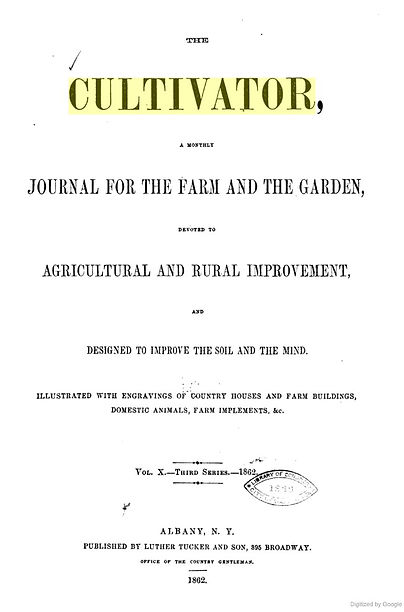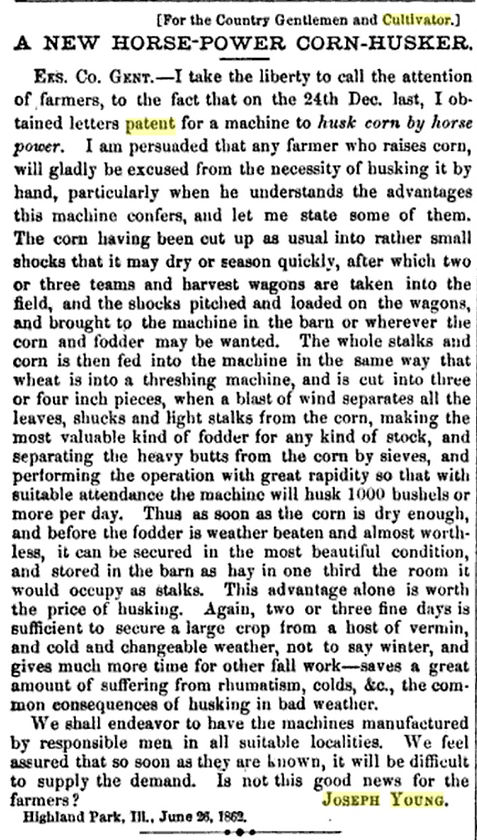Sixteen
The Life and Times of my
16 Great-Great Grandparents
Joseph Young invented a way to husk corn by horse power and the invention was published in the Cultivator (book cover below). Special thanks to my cousin Lib for finding this.





Schooley's Mountain

Schooley Mountain -- William Schooley was born in Morris county, New Jersey, May 30, 1768. Schooley's mountain in that state was named for his grandfather, who owned 15 miles of land about and including the mountain. When Mr. Schooley was a boy of 12, as he was going to mill on one occasion, riding the horse which drew the wagon, he was "pressed into the service" by a company of soldiers, and obliged to cart provisions for the "rebels" for one day, when, as he stated it, he was "honorably discharged." This was at Morristown. Washington and his body-guard were there, and the old gentleman remembered distinctly how the general looked and what he heard him say. The body-guard consisted of about 300 men, mounted on black, gray, and bay horses, in about equal numbers. Mr. Schooley remembered seeing Washington walking arm-in-arm with a Moravian minister, in a large hall, and remembered hearing Gen. W. say to the minister, "Oh, it is hard to march men up to be slaughtered." When we remember the peaceful body to which the Moravian belonged, we see how naturally the conversation would turn upon the horrors of the battle-field. Bye-and-bye, Gen. Washington mounted his horse and rode away with his body-guard. While the general was mounting his horse, his liveried servant held the stirrup, the bright red boot-tops of the servant taking mostly the attention of the boy. The general rode in the centre of his guard, and Mrs. Washington, who was with him, occupied a carriage.

The General Store on Schooley Mountain, about 1830
Correspondene of the Detroit Tribune.
On Wednesday last the measured stroke of the bell, pealing out 102 times, and announced to the people that the oldest inhabitant was dead. William Schooley died that day, age 101 years and eight months. Such a long life as was his entitles him to more than a passing notice. Born several years before the revolutionary war, he remembered, and often related, many instances of that period that "tried men's souls."
William Schooley was born in Morris county, New Jersey, May 30, 1768. Schooley's mountain in that state was named for his grandfather, who owned 15 miles of land about and including the mountain. When Mr. Schooley was a boy of 12, as he was going to mill on one occasion, riding the horse which drew the wagon, he was "pressed into the service" by a company of soldiers, and obliged to cart provisions for the "rebels" for one day, when, as he stated it, he was "honorably discharged." This was at Morristown. Washington and his body-guard were there, and the old gentleman remembered distinctly how the general looked and what he heard him say. The body-guard consisted of about 300 men, mounted on black, gray, and bay horses, in about equal numbers. Mr. Schooley remembered seeing Washington walking arm-in-arm with a Moravian minister, in a large hall, and remembered hearing Gen. W. say to the minister, "Oh, it is hard to march men up to be slaughtered." When we remember the peaceful body to which the Moravian belonged, we see how naturally the conversation would turn upon the horrors of the battle-field. Bye-and-bye, Gen. Washington mounted his horse and rode away with his body-guard. While the general was mounting his horse, his liveried servant held the stirrup, the bright red boot-tops of the servant taking mostly the attention of the boy. The general rode in the centre of his guard, and Mrs. Washington, who was with him, occupied a carriage.
Mr. S. remembered vividly the neighborhood discussions that immediately preceded the war. People gathered in school-houses and barns to talk over the situation and the people of his own neighborhood were divided of loyalists and tories. Mr. Schooley's immediate ancestors were orthodox Friends, and opposed the war from principle, yet he had one brother in the army. He related the saying that "people fought with jack-knives in the school-houses before they went to war." The expression "beyond Nova Scotia," much used by him in his boyhood days, meant "beyond the hills," some of his loyalist neighbors having been sent to Nova Scotia for their persistent adherence to the "home government."
In 1797, Mr. Schooley married Anna Miller. When Bedford, N. Y. was burned, she was a child, and her grandmother pleaded long and successfully to the soldiers to spare her house as the "men were all away." Mrs. S. died many years since. She was aunt to Mrs. Wm. H. Seward.
Mr. Schooley was a very temperate man, never using liquors of any kind except occasionally on public occasions. When about 50, he learned to use tobacco, but, after using it until he was 86, he concluded that it made his hand a little unsteady and quit. His nerves improved, he said, very much after that. He never had a severe fit of sickness, and up to within a few weeks past might have been seen upon the streets almost any day. He was very fond of children, and had a troop of friends among the little ones. He attended church on his 100th birthday, and on his return from church, repeated the text and gave a very fair synopsis of the sermon. He kept the day of the week and month accurately until the last week of his life. Mr. Schooley settled in Seneca county, New York, in 1806, and lived there until 1859, when he removed to Cook county, Ill., and thence to Ypsilanti in 1866, where he resided up to the time of his death. He served as a "minute man" in the war of 1812.